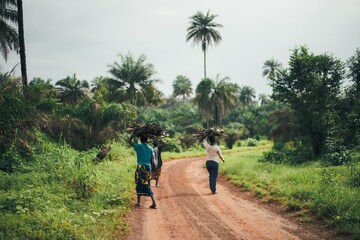Not doing what you “should.”

George Watts, adjunct professor at King’s, who lives and works in Burundi with his family, challenges us to think about calling as something broader than what work we should do. George writes from his personal Christian faith perspective but his words challenge all of us to reconsider how privilege shapes our views of calling. __________________________________________________________________________________________________
Imagine this situation, which plays out every day on the hills around us.
A young child gathers firewood or fetches water. Getting older they’ll graze the family’s three goats if they’re a boy, or tend to younger siblings if they’re a girl. They help with tilling, planting, harvesting the family field. As they age, they find someone from not too far away to marry. They build a small house of mud bricks and hopefully acquire their own small plot of land to grow food to eat, and maybe some extra to sell. They have children. The cycle repeats.
What does God “want them to do” with their lives?
What are they being “called” to do?
What “should” they do with their lives?
Often the core of our concern for “what should I do” is a sense that we have a very specific and direct calling- usually associated with our work. We approach this concept quite differently than the original Biblical authors.
The prophet Micah said God wanted people to: “Act Justly, love mercy, walk humbly with God” {Micah 6:8}
Isaiah said God wanted his people to: “…break the chains of injustice, get rid of exploitation in the workplace, free the oppressed, cancel debts…. sharing your food with the hungry, inviting the homeless poor into your homes, putting clothes on the shivering ill-clad, being available to your own families.” {Is 58:6-7}
When Jesus himself was asked what’s the most important thing I do in my life? He replied: “Love God. Love others.” {Matt 22:37-39}
“Yes fine, but what about ‘my calling’ – the thing/job/role I’m supposed to do? “
We’ve allowed a concept unique to modern, wealthy societies creep into our view of God’s calling when we think this way. In places like rural Burundi, if someone’s father is a sustenance farmer (whose farm is smaller than your garage) they will also certainly be a farmer.
This doesn’t negate that many of these people wish they (or their kids) could be something else. However, it doesn’t change the fact that for most of human history, the idea of choosing our own vocation is unthinkable. If you are a coffee farmer because your father was a coffee farmer, is there any sense in questioning whether God wants you to be a coffee farmer? Maybe you ‘should’ have been a teacher? But if that was never an option, is there any point in agonizing over what never was and never will be?
Why then do those of us with the privilege of exercising so much influence over our ‘work’, feel like we only have one ‘right’ choice to make? We think if we pick the wrong thing, God is not pleased, or at least disappointed.
Let’s start to view our ‘life’s calling’ as being an apprentice of Jesus, first and foremost. Then where we live, what we do for a job, what our home life is like – are all secondary issues. Actually, they are at best a distant second.
If we are called to love others, we can do that in any situation. We can do that as a stay-at-home parent, as an unemployed student, as a music teacher, as an aeronautics engineer, or as a bus driver. If you find yourself any place there are humans around, you have a calling right in front of you. Whether it’s your children, co-workers, neighbors, classmates, that guy who eats lunch at your table, or that woman who sits next to you on the commuter train every day.
Wherever there are people, there are hurts to be shared, stories to be heard. There are ways we can help or at least things we can do to show love.
“A new commandment I give to you: love one another.” -Jesus
That’s Jesus calling for those who want to be his apprentices. And the beauty is that it’s completely independent of any work or life situation.
[1] Originally published at Chartreusian Newsletters June 10, 2021. Reproduced with permission.